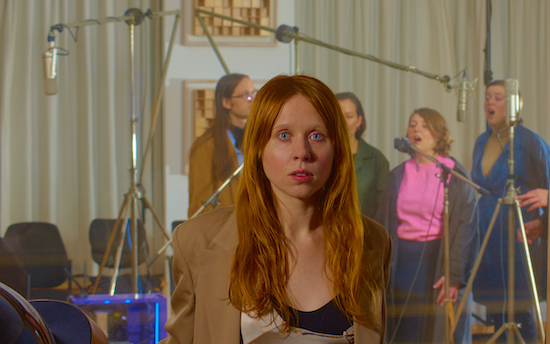Holly Herndon by Boris Camaca
“Amidst a lot of misleading AI hype, it communicates something honest about the state of this technology; it is still a baby. It is important to be cautious that we are not raising a monster.” says Holly Herndon about Spawn, the AI program developed by now-Dr Herndon and partner/collaborator Mat Dryhurst which was used to create PROTO. The process challenges her own position as composer – she writes and plays the music before programming it into Spawn to produce its own sonic ideas.
It’s all quite science fiction. And as sci-fi always suggests, the dawn of a newer technology often leads to us becoming ghosts in the machine, just look at the Silicon Valley-fication of service work or the casual automation of fast food restaurants for an example. So what happens when we become an active part of our own automation? Herndon’s work already has a precedent for recognising the close familiarity innate to the computer as it’s become, as she’s puts it, our most intimate instrument. But whereas her debut album Movement explores it insularly, Proto blows it up from its laptop camera-sized scope.
Introduction, ‘Birth’, is mathematical but completely organic, like trying to discern between the ambient buzzing of nature or the white noise of a computer processing. The result is a constant vying between Herndon and Spawn that accompanies the whole record, ending in a singularity between the two that feels inevitable. No conflict, no replacement – just understanding. The entire album seems to exist in a time where humanity has moved past its own latent anxiety, accepting the inevitability of evolution instead of projecting the existential terror new life and new ways of being alive present.
Proto, the literary birthgiver to protocol and prototype, asks “is this what it’s like to be the first of a new species?”, as heard on track ‘Extreme Love’. And if so, how do we begin to assess something that’s the first of its kind? The whole album wobbles with the uncertainty of potential. The composition tumbles between folk, pop, techno and computer music. Sometimes it’s unrefined like the untethered looping of ‘Bridge’ and sometimes dazzling and terrifying like ‘Crawler’, a track that builds toward the edge of sentience – but it’s never short on ideas.
Track ‘Godmother’ is Spawn’s only named feature, alongside collaborator and musical Godmother to the AI, Jlin, who’s music is fed to the program to produce the track. The result doesn’t exactly reflect the Chicago artist’s work but instead interprets, twists and dishes out rough chops of noise – somehow mimicry finds independence. Herndon constantly marries ideas with what should be it’s opposite, yet the union not only works but feels completely necessary.
The same android-like biology is found on ‘Frontier’, beginning as an astral folk record the song becomes a glitching transmission signal. The refracting vocals on ‘Alienation’ bury emotion deep within the crevice of each glitch and the warped call-and-response chorus of ‘Evening Shades’ distorts human voices until it croaks at an alien frequency. Even the fantastic ‘Eternal’, which has the building blocks of a traditional track – lyrics about love and a dazzling, melodic chorus – sounds like the deciphering of a scrambled pop record through meshed metal.
Each one of the tracks feeds off one another, trade processing power for instinct, make mistakes and rectify, awaken spirit within another. It’s a beautiful, worrying thing to witness – a machine that often knows more about us than we do ourselves beginning to find their own interpretation of its small world of human stimuli. But if Proto’s central question is what are we heading toward, the answer must be a coming together.



